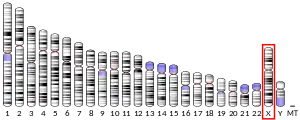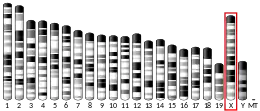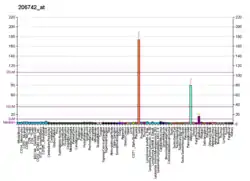C-fos-induced growth factor
C-fos-induced growth factor (FIGF) (or vascular endothelial growth factor D, VEGF-D) is a vascular endothelial growth factor that in humans is encoded by the FIGF gene.[5]
Function
The protein encoded by this gene is a member of the platelet-derived growth factor/vascular endothelial growth factor (PDGF/VEGF) family and is active in angiogenesis, lymphangiogenesis, and endothelial cell growth. This secreted protein undergoes a complex proteolytic maturation, generating multiple processed forms that bind and activate VEGFR-2 and VEGFR-3 receptors. The structure and function of this protein is similar to those of vascular endothelial growth factor C.[5]
Tumor metastasis to lymph nodes
Lymph node metastasis is very often associated with several types of human malignancies. Cancer cells’ journey to lymph node takes place largely through lymphatic tunnel located in and around of primary tumor. VEGF-D's interactions with VEGFR-3 predominantly expressed in lymphatic vessels plays a key role in restructuring lymphatic channel and, hence, able to alter its functions related to fluid and cell transport along the conduits. VEGF-D has been established to be over-expressed in both tumor tissues and patients’ serum samples in several types of human cancer. In addition, VEGF-D expression has been implicated with increased incidence of regional lymph node metastasis. In experimental mice study, genetically modified tumor cell that was forced to produce VEGF-D protein have been established to boost up regional lymph nodes metastases.[6]
References
- GRCh38: Ensembl release 89: ENSG00000165197 - Ensembl, May 2017
- GRCm38: Ensembl release 89: ENSMUSG00000031380 - Ensembl, May 2017
- "Human PubMed Reference:". National Center for Biotechnology Information, U.S. National Library of Medicine.
- "Mouse PubMed Reference:". National Center for Biotechnology Information, U.S. National Library of Medicine.
- "Entrez Gene: FIGF c-fos induced growth factor (vascular endothelial growth factor D)".
- Stacker SA, Caesar C, Baldwin ME, Thornton GE, Williams RA, Prevo R, Jackson DG, Nishikawa S, Kubo H, Achen MG (Feb 2001). "VEGF-D promotes the metastatic spread of tumor cells via the lymphatics". Nature Medicine. 7 (2): 186–91. doi:10.1038/84635. PMID 11175849. S2CID 24131240.
External links
- Human FIGF genome location and FIGF gene details page in the UCSC Genome Browser.
Further reading
- Maruyama K, Sugano S (Jan 1994). "Oligo-capping: a simple method to replace the cap structure of eukaryotic mRNAs with oligoribonucleotides". Gene. 138 (1–2): 171–4. doi:10.1016/0378-1119(94)90802-8. PMID 8125298.
- Orlandini M, Marconcini L, Ferruzzi R, Oliviero S (Oct 1996). "Identification of a c-fos-induced gene that is related to the platelet-derived growth factor/vascular endothelial growth factor family". Proceedings of the National Academy of Sciences of the United States of America. 93 (21): 11675–80. doi:10.1073/pnas.93.21.11675. PMC 38117. PMID 8876195.
- Yamada Y, Nezu J, Shimane M, Hirata Y (Jun 1997). "Molecular cloning of a novel vascular endothelial growth factor, VEGF-D". Genomics. 42 (3): 483–8. doi:10.1006/geno.1997.4774. PMID 9205122.
- Suzuki Y, Yoshitomo-Nakagawa K, Maruyama K, Suyama A, Sugano S (Oct 1997). "Construction and characterization of a full length-enriched and a 5'-end-enriched cDNA library". Gene. 200 (1–2): 149–56. doi:10.1016/S0378-1119(97)00411-3. PMID 9373149.
- Achen MG, Jeltsch M, Kukk E, Mäkinen T, Vitali A, Wilks AF, Alitalo K, Stacker SA (Jan 1998). "Vascular endothelial growth factor D (VEGF-D) is a ligand for the tyrosine kinases VEGF receptor 2 (Flk1) and VEGF receptor 3 (Flt4)". Proceedings of the National Academy of Sciences of the United States of America. 95 (2): 548–53. Bibcode:1998PNAS...95..548A. doi:10.1073/pnas.95.2.548. PMC 18457. PMID 9435229.
- Rocchigiani M, Lestingi M, Luddi A, Orlandini M, Franco B, Rossi E, Ballabio A, Zuffardi O, Oliviero S (Jan 1998). "Human FIGF: cloning, gene structure, and mapping to chromosome Xp22.1 between the PIGA and the GRPR genes". Genomics. 47 (2): 207–16. doi:10.1006/geno.1997.5079. PMID 9479493.
- Stacker SA, Stenvers K, Caesar C, Vitali A, Domagala T, Nice E, Roufail S, Simpson RJ, Moritz R, Karpanen T, Alitalo K, Achen MG (Nov 1999). "Biosynthesis of vascular endothelial growth factor-D involves proteolytic processing which generates non-covalent homodimers". The Journal of Biological Chemistry. 274 (45): 32127–36. doi:10.1074/jbc.274.45.32127. PMID 10542248.
- Nakamura Y, Yasuoka H, Tsujimoto M, Yang Q, Imabun S, Nakahara M, Nakao K, Nakamura M, Mori I, Kakudo K (Feb 2003). "Prognostic significance of vascular endothelial growth factor D in breast carcinoma with long-term follow-up". Clinical Cancer Research. 9 (2): 716–21. PMID 12576440.
- Yokoyama Y, Charnock-Jones DS, Licence D, Yanaihara A, Hastings JM, Holland CM, Emoto M, Umemoto M, Sakamoto T, Sato S, Mizunuma H, Smith SK (Jan 2003). "Vascular endothelial growth factor-D is an independent prognostic factor in epithelial ovarian carcinoma". British Journal of Cancer. 88 (2): 237–44. doi:10.1038/sj.bjc.6600701. PMC 2377043. PMID 12610509.
- Rissanen TT, Markkanen JE, Gruchala M, Heikura T, Puranen A, Kettunen MI, Kholová I, Kauppinen RA, Achen MG, Stacker SA, Alitalo K, Ylä-Herttuala S (May 2003). "VEGF-D is the strongest angiogenic and lymphangiogenic effector among VEGFs delivered into skeletal muscle via adenoviruses". Circulation Research. 92 (10): 1098–106. doi:10.1161/01.RES.0000073584.46059.E3. PMID 12714562.
- Funaki H, Nishimura G, Harada S, Ninomiya I, Terada I, Fushida S, Tani T, Fujimura T, Kayahara M, Shimizu K, Ohta T, Miwa K (2003). "Expression of vascular endothelial growth factor D is associated with lymph node metastasis in human colorectal carcinoma". Oncology. 64 (4): 416–22. doi:10.1159/000070301. PMID 12759540. S2CID 45760526.
- Orlandini M, Semboloni S, Oliviero S (Nov 2003). "Beta-catenin inversely regulates vascular endothelial growth factor-D mRNA stability". The Journal of Biological Chemistry. 278 (45): 44650–6. doi:10.1074/jbc.M304255200. PMID 12920128.
- McColl BK, Baldwin ME, Roufail S, Freeman C, Moritz RL, Simpson RJ, Alitalo K, Stacker SA, Achen MG (Sep 2003). "Plasmin activates the lymphangiogenic growth factors VEGF-C and VEGF-D". The Journal of Experimental Medicine. 198 (6): 863–8. doi:10.1084/jem.20030361. PMC 2194198. PMID 12963694.
- Vlahakis NE, Young BA, Atakilit A, Sheppard D (Feb 2005). "The lymphangiogenic vascular endothelial growth factors VEGF-C and -D are ligands for the integrin alpha9beta1". The Journal of Biological Chemistry. 280 (6): 4544–52. doi:10.1074/jbc.M412816200. PMC 1368959. PMID 15590642.
- Kurahara H, Takao S, Maemura K, Shinchi H, Natsugoe S, Aikou T (Dec 2004). "Impact of vascular endothelial growth factor-C and -D expression in human pancreatic cancer: its relationship to lymph node metastasis". Clinical Cancer Research. 10 (24): 8413–20. doi:10.1158/1078-0432.CCR-04-0379. PMID 15623620.
- Fink AM, Kaltenegger I, Schneider B, Frühauf J, Jurecka W, Steiner A (Dec 2004). "Serum level of VEGF-D in patients with primary lymphedema". Lymphology. 37 (4): 185–9. PMID 15693535.
- Kaushal V, Mukunyadzi P, Dennis RA, Siegel ER, Johnson DE, Kohli M (Jan 2005). "Stage-specific characterization of the vascular endothelial growth factor axis in prostate cancer: expression of lymphangiogenic markers is associated with advanced-stage disease". Clinical Cancer Research. 11 (2 Pt 1): 584–93. doi:10.1158/1078-0432.584.11.2. PMID 15701844.
- Yasuoka H, Nakamura Y, Zuo H, Tang W, Takamura Y, Miyauchi A, Nakamura M, Mori I, Kakudo K (Aug 2005). "VEGF-D expression and lymph vessels play an important role for lymph node metastasis in papillary thyroid carcinoma". Modern Pathology. 18 (8): 1127–33. doi:10.1038/modpathol.3800402. PMID 15803188.




